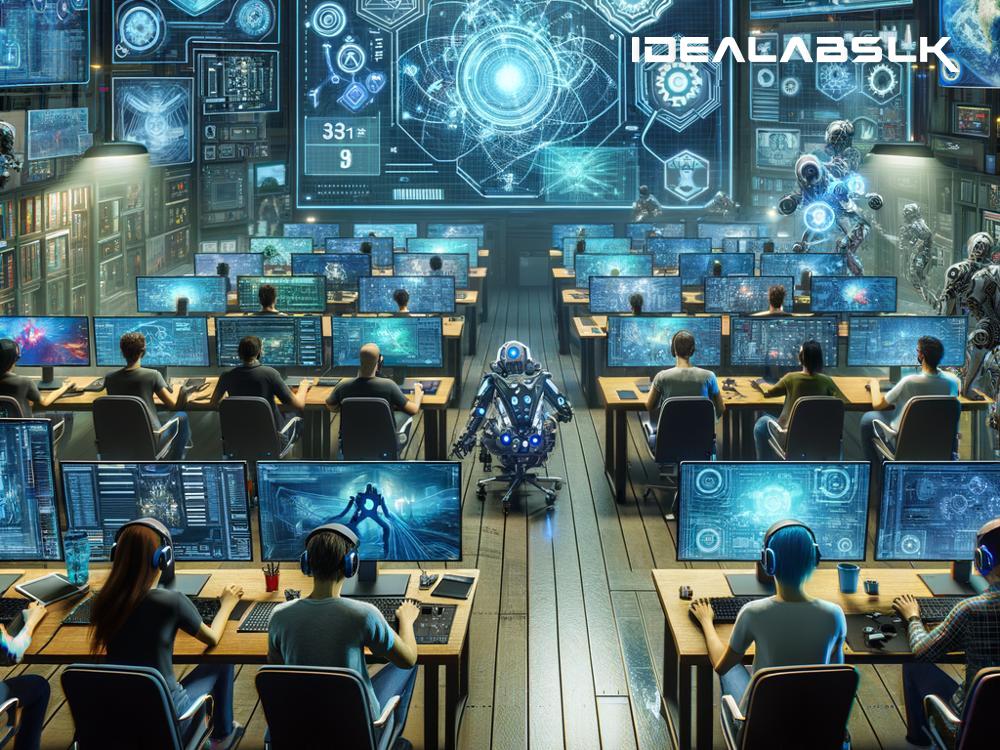Title: The Future is Bright: How AI in Games Will Revolutionize User Interfaces by 2025
In the world of video games, innovation is the name of the game. As we march ahead towards 2025, one of the most exciting frontiers of this evolution is the role of Artificial Intelligence (AI) in shaping user interfaces (UI). For those of us who love immersing ourselves in digital worlds, AI is set to transform our gaming experiences by making UIs more intuitive, personalized, and engaging than ever before. Let’s dive into how this fascinating turn of events is expected to unfold.
The Current State of UI in Games
Right now, game UIs are primarily designed by human developers and designers. They do a fantastic job, but there's always room for improvement. Sometimes, interfaces can be clunky, difficult to navigate, or not very intuitive, especially for newcomers. They may not adapt well to different players' needs or preferences, potentially hindering the overall gaming experience.
Enter AI: The Game Changer
Imagine a game that learns how you play and adjusts its interface to suit your personal preferences and play style. Sounds like science fiction? Well, by 2025, this is likely going to be the new normal, thanks to AI.
Personalized Interfaces
AI can monitor how you interact with the game, learning what you like or dislike, and what you find easy or challenging. Using this information, it can customize the UI to better suit your needs. For example, if you frequently struggle to find certain options or controls, AI could make these more prominent or accessible for you. This makes for a smoother and more enjoyable gaming experience that feels tailored just for you.
Dynamic Adaptation
Different game scenarios might necessitate different types of interfaces. AI can dynamically adjust the UI based on what’s happening in the game. In a peaceful exploration phase, you might see a minimal UI to immerse you deeper into the world. But when you jump into combat, critical information and controls could become more prominent. This adaptability ensures that the interface always complements, rather than distracts from, the gaming experience.
Enhanced Accessibility
AI-driven UIs promise to make games more accessible to people with disabilities. By understanding a player’s specific needs, AI can adjust the UI to accommodate various impairments, whether they're related to vision, hearing, motor skills, or cognitive processing. This inclusivity means that more people than ever can enjoy gaming, breaking down barriers that have traditionally kept some players on the sidelines.
Voice Commands and Natural Language Processing
Voice interaction with games is already on the rise, but by 2025, it's set to reach new heights with AI. Natural language processing allows players to communicate with the game using everyday language, making it easier and more natural to control game functions, chat with AI characters, or even influence the game's story. This can dramatically enhance the immersion and interactivity of games.
Anticipating Player Needs
Beyond reactive changes, AI in UI can also be proactive, anticipating the player’s needs before they even articulate them. For example, if the AI notices you're running low on health in a game and you often forget to heal, it might subtly highlight your health supplies or suggest taking a moment to recover. This kind of anticipation can make gameplay feel more fluid and engaging.
Challenges and Considerations
While the future possibilities of AI in game UIs sound incredible, there are challenges to navigate. Privacy concerns are paramount, as AI would need to collect and analyze data on players' behaviors and preferences. Ensuring this data is handled securely and ethically is crucial.
Furthermore, there's a delicate balance to strike in making interfaces helpful without becoming intrusive or removing too much challenge from the game. Game developers will need to tread carefully to ensure AI enhances rather than detracts from the gaming experience.
The Path Ahead
As we look towards 2025, the fusion of AI and game UIs is set to redefine our gaming experiences. With personalized, adaptive, and accessible interfaces, games will become more intuitive, engaging, and inclusive. This evolution promises to open up new possibilities for how we play and interact with digital worlds, making the future of gaming brighter and more exciting than ever.

